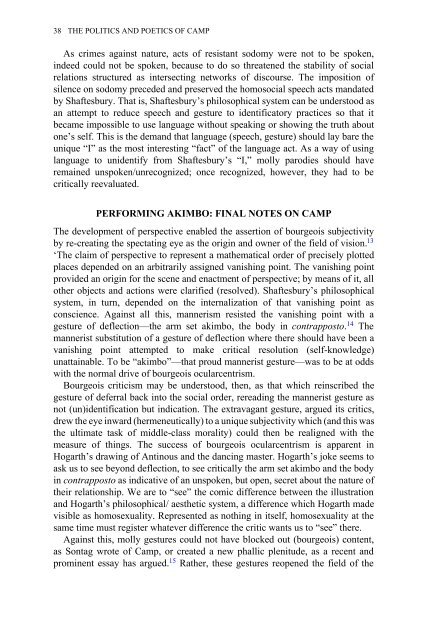Edited by Moe Meyer - Get a Free Blog
Edited by Moe Meyer - Get a Free Blog
Edited by Moe Meyer - Get a Free Blog
You also want an ePaper? Increase the reach of your titles
YUMPU automatically turns print PDFs into web optimized ePapers that Google loves.
38 THE POLITICS AND POETICS OF CAMP<br />
As crimes against nature, acts of resistant sodomy were not to be spoken,<br />
indeed could not be spoken, because to do so threatened the stability of social<br />
relations structured as intersecting networks of discourse. The imposition of<br />
silence on sodomy preceded and preserved the homosocial speech acts mandated<br />
<strong>by</strong> Shaftesbury. That is, Shaftesbury’s philosophical system can be understood as<br />
an attempt to reduce speech and gesture to identificatory practices so that it<br />
became impossible to use language without speaking or showing the truth about<br />
one’s self. This is the demand that language (speech, gesture) should lay bare the<br />
unique “I” as the most interesting “fact” of the language act. As a way of using<br />
language to unidentify from Shaftesbury’s “I,” molly parodies should have<br />
remained unspoken/unrecognized; once recognized, however, they had to be<br />
critically reevaluated.<br />
PERFORMING AKIMBO: FINAL NOTES ON CAMP<br />
The development of perspective enabled the assertion of bourgeois subjectivity<br />
<strong>by</strong> re-creating the spectating eye as the origin and owner of the field of vision. 13<br />
‘The claim of perspective to represent a mathematical order of precisely plotted<br />
places depended on an arbitrarily assigned vanishing point. The vanishing point<br />
provided an origin for the scene and enactment of perspective; <strong>by</strong> means of it, all<br />
other objects and actions were clarified (resolved). Shaftesbury’s philosophical<br />
system, in turn, depended on the internalization of that vanishing point as<br />
conscience. Against all this, mannerism resisted the vanishing point with a<br />
gesture of deflection—the arm set akimbo, the body in contrapposto. 14 The<br />
mannerist substitution of a gesture of deflection where there should have been a<br />
vanishing point attempted to make critical resolution (self-knowledge)<br />
unattainable. To be “akimbo”—that proud mannerist gesture—was to be at odds<br />
with the normal drive of bourgeois ocularcentrism.<br />
Bourgeois criticism may be understood, then, as that which reinscribed the<br />
gesture of deferral back into the social order, rereading the mannerist gesture as<br />
not (un)identification but indication. The extravagant gesture, argued its critics,<br />
drew the eye inward (hermeneutically) to a unique subjectivity which (and this was<br />
the ultimate task of middle-class morality) could then be realigned with the<br />
measure of things. The success of bourgeois ocularcentrism is apparent in<br />
Hogarth’s drawing of Antinous and the dancing master. Hogarth’s joke seems to<br />
ask us to see beyond deflection, to see critically the arm set akimbo and the body<br />
in contrapposto as indicative of an unspoken, but open, secret about the nature of<br />
their relationship. We are to “see” the comic difference between the illustration<br />
and Hogarth’s philosophical/ aesthetic system, a difference which Hogarth made<br />
visible as homosexuality. Represented as nothing in itself, homosexuality at the<br />
same time must register whatever difference the critic wants us to “see” there.<br />
Against this, molly gestures could not have blocked out (bourgeois) content,<br />
as Sontag wrote of Camp, or created a new phallic plenitude, as a recent and<br />
prominent essay has argued. 15 Rather, these gestures reopened the field of the


